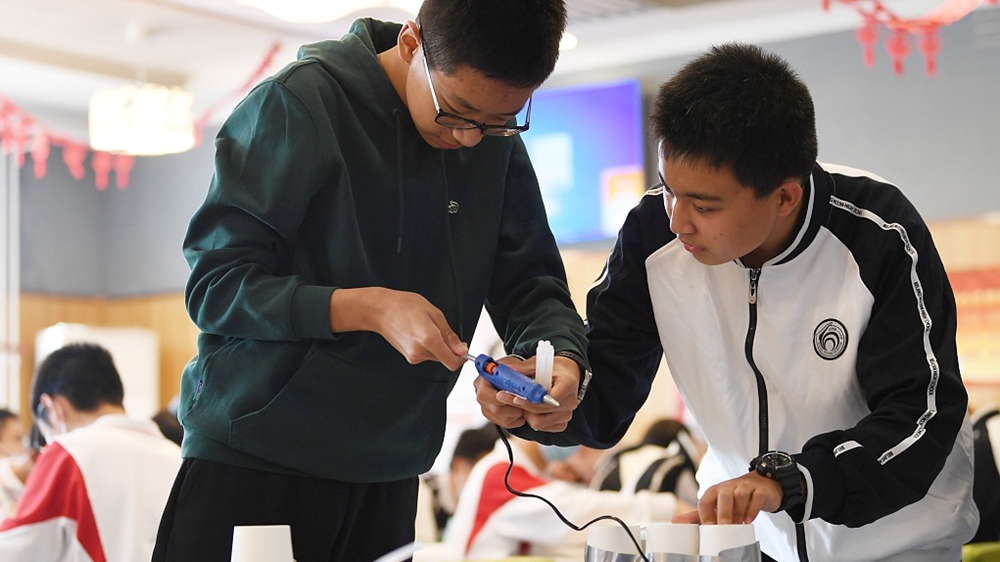
Leading entrepreneurs and scholars worldwide discuss the attributes delineating Gen Z from other generations, and why businesses need to pay attention at a forum held by CGTN in Beijing, October 18, 2021. /CGTN
Leading entrepreneurs and scholars worldwide discuss the attributes delineating Gen Z from other generations, and why businesses need to pay attention at a forum held by CGTN in Beijing, October 18, 2021. /CGTN
Gen Z, people born between 1996 and 2012, are coming into their own and are ready to stamp their identity on the world. Confident, urbane and sophisticated, Gen Z know what they want and how to get it.
Leading entrepreneurs and scholars worldwide discussed the attributes delineating Gen Z from other generations and why businesses need to pay attention at a forum hosted by CGTN in Beijing on Monday.
The forum sought to discover the impact this cohort would have on the resurgence of Chinese brands, with their trendsetting consumption patterns.
According to a recent McKinsey report, Gen Z is the first generation of digital natives who adopt technology early, expect and demand more from brands, and are accustomed to rapid changes in technology and fashion.
In turn, they tend to stay loyal to these brands. In China, they represent about 13 percent of the population. Already, they are asserting themselves and choosing paths that diverge from preceding generations.
For instance, they have demonstrated a preference for indigenous brands that is unmatched in recent memory.
To understand the economic impact of Gen Z, dubbed the "moonlight clan," on the Chinese internet, could wield on brands, it is necessary to answer some pertinent questions, helpfully posed to guests at the forum.
For instance, what consumption trends are Gen Z consumers setting? How would technology and innovation shape these trends? And, as this generation joins the workforce, what kind of employers do they prefer?
A 'born digital' generation
Born as digital natives, Gen Z tends to be more tech-savvy and more comfortable shopping online than their counterparts from previous times. They expect an interactive environment where the lines between the real and virtual worlds are ever so thin.
The Chinese Gen Z, much like their cohorts from around the world, is quite open-minded and willing to try out things, having grown up in a more connected world.
However, if they are to part with their money, they expect high quality products and services in return. It is not enough to have glitz and glamour; there must be substance beneath the razzmatazz.

Two students do a scientific experiment at a middle school in Beijing, October 10, 2021. /CFP
Two students do a scientific experiment at a middle school in Beijing, October 10, 2021. /CFP
Chinese brands alive to this trend have reaped the rewards. A direct consequence of this is "born in China fashion," a term coined by Zhang Qing, brand manager at Klee Klee, a sustainable fashion firm.
As for Gen Z, fashion is made with locally sourced materials and infused with Chinese aesthetics.
David Lindlbauer, an assistant professor at the Human-Computer Interaction Institute, Carnegie Mellon University, said that a deeper understanding of humans and tech would lead to entrepreneurs better adapting to new tech.
He reckons that immersive technology, like virtual reality, and big data analysis will become more paramount in Gen Z consumption.
For Yu Zhou, co-founder and president of Light Chaser Animation Studios, art and technology are the two legs upon which animation stands. So he daily observes how members of Gen Z interact with both. Striking a balance between the two has been critical to the success of his studio's hits.
Therefore, he considers the artistic domain as one where the impact of technological innovation would be most apparent in consumption choices.
Environmentally conscious consumers
Gen Z consumers also genuinely care about the environment, Zhang said.
Observing the environmental pollution caused by the fashion industry, Klee Klee's founders decided to start a company using "green cotton." It is no coincidence that demand for pesticide-free cotton products is highest amongst Gen Z consumers.
There are more firms along the fashion value chain in China that are increasingly pursuing sustainable practices. Zhang cited as an example a Sichuan-based biodynamic farm producing silk.
The farm has managed to not only reduce water consumption, but also replenish soil nutrients. Alley Liang, CEO of Aureline & Co, a cosmetics manufacturer using only natural ingredients, echoes similar sentiments as demand for its products has soared.

